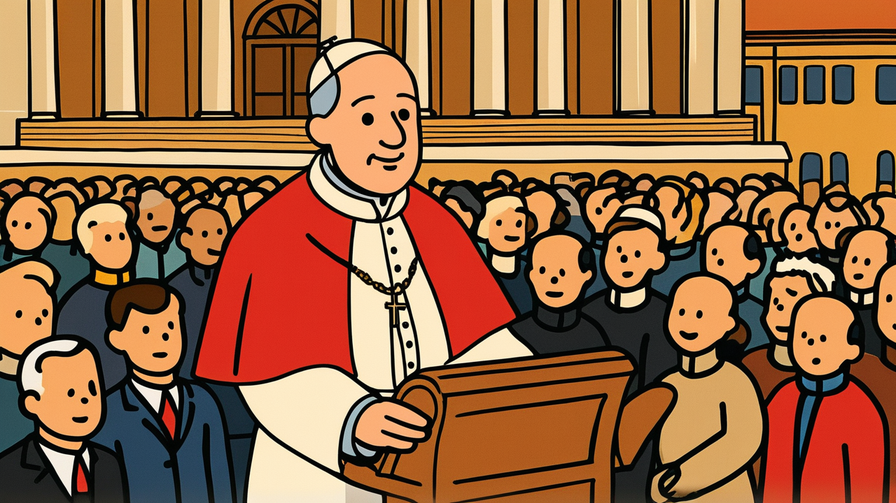[Disclaimer] This article is reconstructed based on information from external sources. Please verify the original source before referring to this content.
News Summary
The following content was published online. A translated summary is presented below. See the source for details.
On May 8, 2025, Robert Francis Prevost, a 69-year-old American cardinal from Chicago, Illinois, was elected as the new Pope of the Catholic Church. He has chosen the name Pope Leo XIV, making him the first American Pope in the Church’s 2,000-year history. Before his election, Prevost served as a member of the Order of Saint Augustine, was Bishop Emeritus of Chiclayo in Peru, and held the position of Cardinal in the Roman Curia. His educational background includes degrees from Villanova University, Catholic Theological Union, and the Pontifical University of St. Thomas Aquinas. Throughout his career, he has dedicated significant time to missionary work in Peru and served as Prefect of the Dicastery for Bishops. In his first public address at St. Peter’s Square, Pope Leo XIV paid tribute to his predecessor, Pope Francis.
Source: Wikinews-pt
Our Commentary
Background and Context
The election of an American Pope represents a groundbreaking moment in Catholic Church history. For centuries, the papacy has been dominated by European cardinals, particularly from Italy. The last non-European Pope before Francis was Gregory III, who came from Syria and served from 731 to 741 AD. This shift to an American Pope reflects the changing demographics of global Catholicism, where Latin America, Africa, and North America now represent the majority of the world’s Catholic population.
The papal election process, known as a conclave, involves all cardinals under age 80 gathering in the Sistine Chapel to select the new Pope. The fact that Prevost was chosen suggests strong support from cardinals worldwide, indicating a desire for fresh perspectives in Church leadership.
Expert Analysis
Religious scholars view this election as a significant turning point for the Catholic Church. Prevost’s extensive missionary experience in Peru gives him unique insights into the challenges facing Catholics in developing nations. His background in the Augustinian order, known for its emphasis on education and community service, may signal a renewed focus on these areas during his papacy.
His previous role as Prefect of the Dicastery for Bishops means he has deep knowledge of Church administration and the global network of Catholic leaders. This administrative experience, combined with his American background, could bring a more modern approach to Vatican operations while respecting Church traditions.
Additional Data and Fact Reinforcement
The Catholic Church currently serves approximately 1.4 billion members worldwide, making it the largest Christian denomination. In the United States alone, there are about 70 million Catholics, representing roughly 21% of the population. Prevost’s election may strengthen ties between the Vatican and American Catholics, who have sometimes felt distant from Rome.
Pope Leo XIV, at 69 years old, is relatively young for a Pope. His predecessor Pope Francis was 76 when elected, and Benedict XVI was 78. This could mean a potentially longer papacy, allowing for more substantial reforms and initiatives.
Related News
Recent Church statistics show that while Catholicism is declining in Europe, it continues to grow in Africa, Asia, and the Americas. The Church has also been addressing environmental concerns, with Pope Francis’s encyclical on climate change setting a precedent for religious leadership in ecological matters. Additionally, the Vatican has been working to modernize its financial systems and increase transparency following various scandals in recent years.
Summary
The election of Pope Leo XIV marks a historic shift in Catholic Church leadership. As the first American Pope, Robert Prevost brings a unique perspective shaped by his missionary work in Peru and his administrative experience in the Vatican. His papacy is expected to bridge traditional Catholic values with contemporary challenges, potentially bringing fresh approaches to issues facing the global Church. The coming months will reveal how this historic choice impacts the direction of Catholicism worldwide.
Public Reaction
Initial reactions from American Catholics have been overwhelmingly positive, with many expressing pride that one of their own has been chosen to lead the global Church. Catholic organizations in Peru, where Prevost spent years in missionary work, have also celebrated the news, highlighting his dedication to serving poor communities. Social media has been buzzing with the hashtag #FirstAmericanPope, as believers worldwide share their hopes for the new papacy.

